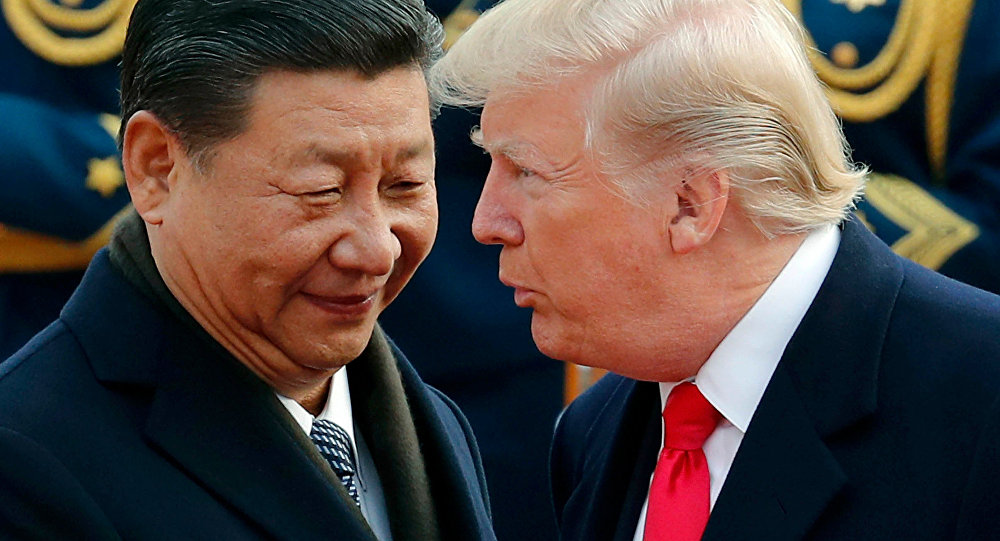www.aljazeerah.info
Opinion Editorials, December 2018
Archives
Mission & Name
Conflict Terminology
Editorials
Gaza Holocaust
Gulf War
Isdood
Islam
News
News Photos
Opinion Editorials
US Foreign Policy (Dr. El-Najjar's Articles)
www.aljazeerah.info
President Trump's Presidency: Results and Perspectives By James Petras Al-Jazeerah, CCUN, December 3, 2018 |
 |
 |
|
President Trumpís Presidency: Results and Perspectives
Introduction
We need an objective evaluation of the Presidentís foreign and
domestic polices Ė
the means, the goals, their results and
consequences. The Trump performance requires
we discuss the style
and substance of foreign and domestic policies.
We will ignore the fly swatting by Trump critics who ply peripheral
issues Ė the
state investigation of the fading Russian conspiracy
tales--- and focus on strategic issues
that purport to transform
global economic, political and social relations.
ĎTrump at Workí: Foreign Policy
President Trump has a strategy and he works hard at realizing it.
High on Trumpís agenda is, first and foremost, asserting US global
supremacy by
word and deed.
In pursuit of world power, he utilizes multiple weapons: he believes
in the magic
powers of weapons and words. He asserts that prior
Presidents Ďwere weak and allowed
others to exploit usí. Today,
under Trumpís leadership, he claims we are strong and
flexing our
power everywhere at all time.
How does the President reveal strength? Through multiple wars, severe
sanctions, increased military spending and greater concentration of
wealth, in strategic
locations.
As a result, according to Trump, we intimidate rivals, competitors
and
adversaries.
Trump cites numerous examples. In Syria, we occupy regions, build new
military
bases, hire and arm more mercenaries and drop larger bombs
on more Syrian cities.
Trump boasts that he weakens Iran by ending
the nuclear agreement, increasing sanctions
precipitating an imminent
collapse and regime change. Trump trumpets the success of the
economic trade war against China and the downfall of Russia by
encircling them with
nuclear missiles , military bases and economic
sanctions.
Trump hails new political successes and military allies in Latin America.
Argentina,Brazil, Colombia, Chile and Ecuador are viewed as Trumpís
market successes
and providing a vassal army to overthrow the
governments of Venezuela, Cuba and
Nicaragua.
Trump brags about his success in Ďrenegotiatingí NAFTA, renaming it
and
claiming more favorable trade Ďdealsí with Mexico and Canada.
The European Union and each of its members have felt the wrath of
Trumpís
threat of trade wars, and his demands for greater military
contributions to NATO.
He has demanded the Germans buy US oil and gas
instead of Russian; he
threatens to sanction European corporations
who dare to abide by agreements with Iran;
Trump boasts of
hundred-billion-dollar arms sale with Saudi Arabia, while affirming US
supremacy in the Middle East and North Africa.
President
Trump, according to his bluster and boisterous self-acclaim, has won
every war, conquered all competitors and has laid the groundwork for an
ĎAmerican
Centuryí.
How many of Trumpís foreign policy twitters correspond to the real
world and
how many are empty-handed ejaculations?
President Trump: Claims and Reality
Trumpís foreign policy strategy is mostly bluster than conquest, more
boisterous
than business, more bluff than success.
Letís start with Russia. Trumpís sanctions and military encirclement
have failed
to weaken Russia. Berlin deepens trade ties with the
Kremlin Ė buys more oil and gas,
builds pipelines and affirms EU
autonomy in dealing with Russia. Military encirclement
involves
third rate Baltic partners, and missile bases stationed in Poland. In
contrast
Russia has deepened multi-billion-dollar military and
economic agreements with China, a
world power.
Russia has responded to Trumpís ending of nuclear missile agreements
by
building superior weaponry. By any measure, Russia has defeated
Trumpís sanctions and
military threats.
Despite Trumpís bombast about Ďsqueezing Chinaí with tariffs, Chinaís
trade
surplus with the US has increased, while the US trade deficit
has risen.
The US has grown by 2.8%, Chinaís by 6.5%. The US has
failed to convince any
of its Asian allies to join its trade war
against China. On the contrary, US so-called trade
war has
encouraged Asia to replace US exporters. While Trumpís economic advisers
threaten Wall Streetís largest bankers to stop making billion dollar
deals with China,
most have brushed Trump off. The bankers ignore
Trumpís Ďtrade warí because profits
count more than gaseous
rhetoric.
Saudi Arabia signs a $110 billion-dollar military agreement with
Trump and then
buys only 10% . . . Ďfake dealsí to paraphrase the
President.
Trumpís claim that the Saudis are a great ally ,yet it boycotts
Qatar, which houses
the biggest US military base in the region.
Israel, Trumpís Middle East ally, ignores
Trumpís economic sanctions
with Russia and trade war with China, two of its biggest
high-tech
trade partners.
The US wars are losing propositions. Afghan rebels control most of
the country,
surround the provincial capitals and force US generals
to seek withdrawal. US allies in
Syria have retreated. He relies on
Kurdish separatists who have their own agenda, not
Trumpís.
In Latin America, Trump collects kudos from far-right regimes in
Brazil and
Argentina which hover on the verge of economic collapse,
social crisis and political
upheaval.
Domestic
Success of Dubious Value
Trump trumpets his big tax cut for billionaires with overseas
holdings. He claims
it is a success story Ė creating jobs and
producing growth. In fact, over three quarters of
the returned
profits have resulted in buy-backs increasing corporate dividends not
investment in productive activity.
Trumpís trade war with China has not added jobs Ė it has added cost
for
consumers through higher prices.
His pro-business policies have strengthened the leverage of
corporations in
securing multi-billion-dollar concessions from local
and state governments. Jeff Bezos
the multi-billion dollar owner of
Amazon, received over $10 billion dollars in tax
exemptions, in
addition to state financed concessions.
In effect Trumpís large scale, long-term income transfers benefit the
rich over the
poor, increase inequalities and lowering public funds
for education, health and welfare.
Trumpís opposition to public
health for all, international climate change
agreements, national
infrastructure investments and regulation of bank oversight, has
increased the risk of natural disasters , financial crises and transport
breakdowns.
Despite his retrograde domestic program, Trump retains
electoral support and
does not face an immediate political threat
---for one basic reason: The Democrats offer
no alternatives.
The corporate Democrats who lead the Party, back all of his
retrograde policies:
they support Trumpís increases in military
spending; support tax reduction for the rich;
oppose a national
health program for all.
Moreover, during Democratic President Obamaís two terms in office,
trillions of
dollars bailed out the biggest banks while 3 million
households suffered foreclosures;
minimum wages remained below the
poverty level; inequalities widened ,as did racial
disparities.
Under President Obama 2 million immigrants were seized and expelled,
establishing a precedent for Trumpís anti-asylum policies.
In other words, Trumpís policies are a continuation and exacerbation
of the
Obama regime.
Conclusion
Trumpís domestic and foreign policy demagogically capitalized on the
failures of
the Democratic Partyís corporate socio-economic programs
and multiple wars.
As a result, Trumpís exploited popular discontent and attracted big
business
support by promising lower taxes and the end of
regulations. In practice Trumpís
aggressive foreign and domestic
policies contributed and added to Washingtonís isolation
and decline.
None of Trumpís original objectives have been achieved. The US has
multiplied adversaries who have grown stronger and more unified.
Washington has lost
established markets without gaining new ones.
His original electoral support has
declined without gaining new
adherents. Trumpís reliable Ďalliesí (Israel, Saudi Arabia
Germany,
etc.) have undermined his aggressive trade policies to China and Russia.
Anti
Iran sanctions have exempted the biggest buyers of Teheranís oil
exports. If Trump has
failed to secure his domestic and foreign
policy objectives these failures have not led to
any major loss of
influence.
Europe is internally divided and unable to formulate any
consequential
alternatives. Latin America faces economic crises
which precludes any joint military
intervention despite Ďpaper
agreementsí.
But the biggest failure is Trumpís policies to China. Each and
everyone of
Trumpís major Asian allies has retained and increased
trade agreements with Beijing.
Trumpís premature celebration of
diplomatic victory over North Korea has evaporated.
North Korea has
returned to and extended ties with China and Russia.
Trumpís strategic decisions have failed to secure his objectives. Not
a single
world-shaking change has taken place. Trumpís generals may
abandon Afghanistan but
no thanks to the Democrats or Europeans.
Trump trade wars with China has failed to secure
more jobs in America, but his
Wall Street critics have negotiated
bigger and more lucrative financial deals.
In a word, Trumpís failures have not led to greater and better
conditions for
global markets, nor ended wars or improved living
standards. Nevertheless many
progressives are pleased by Trumpís
failures even though they are not beneficiaries.
***
Share the link of this article with your facebook friends
|
|
|
|
||
|
||||||


